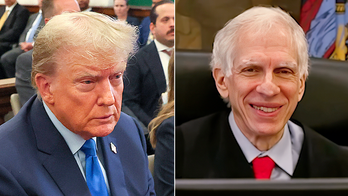Did China's influence over WHO interfere with global response to coronavirus pandemic?
Insight from Bradley Thayer, political science professor at the University of Texas-San Antonio.
Get all the latest news on coronavirus and more delivered daily to your inbox. Sign up here.
A former intelligence official from the Reagan administration is concerned that China is using the shutdown of the American economy during the coronavirus pandemic to their competitive advantage, and suggests that restarting a Cold War-era program he led could be the key to keeping them at bay and spurring American growth.
In the 1980s, physicist Michael Sekora was the director of Project Socrates, an initiative of the Defense Intelligence Agency that looked to exploit existing technologies to keep the U.S. ahead of the rest of the world. The program was shuttered in 1990, after the end of the Reagan administration and as the Cold War was drawing to a close.
Now Sekora believes reviving it is “the only way” to keep China in check.
NATIONAL SECURITY ADVISER PRESSED ON HOW CHINA WILL BE PUNISHED FOR COVID-19 PANDEMIC
“If we look at what’s going to happen right now and you look at the virus,” Sekora said in an interview with Fox News, “they’re using that to improve their competitive edge.”
He argues the U.S. has been at a disadvantage even before this crisis — which has seen much of the U.S. economy shuttered as Washington spends trillions to keep families and businesses afloat. This, as China claims to be emerging from the pandemic which started inside the country.
According to Sekora, the U.S. has been at a self-imposed disadvantage due to a “finance-based planning” economic strategy that focuses on maximizing profits in the short-term rather than producing the best products to establish long-term market dominance. He said this has been the case since the time following World War II when the U.S. lacked serious global competition. In the decades that followed, however, countries such as Russia, China, Japan, and India have used “technology-based planning” to grow at tremendous rates.
Project Socrates was the result of the Reagan administration believing that a return to a tech-focused approach – overseen by the government – would help counter the Soviet Union. It involved a system that included a program that mapped out existing technologies and identified competitors while playing the “what-if game” to predict how the tech environment might develop.
Sekora explained that technological advances occur when two existing technologies combine, and Socrates was to be used to create what he called “automated innovation.”
CHINA UPS ITS SPY GAME ON US SOIL AS IT BIDS TO CONTROL CORONAVIRUS NARRATIVE
If this sounds complicated, it is because it is part of what Sekora called “a technology chess game” where countries try to acquire technologies and block others from doing the same.
He acknowledges that modern-day American tech giants like Google and Apple engage in such planning, but argues that the country needs a centralized approach with government backing.
He said President Ronald Reagan was about to sign an executive order creating a new federal agency dedicated to this effort, and that all U.S. companies were to have access to Socrates, but it never happened. When President George H.W. Bush took office, he scrapped the project.
Sekora believes bringing it back is the best way the U.S. can recover from the current economic crisis and keep China from establishing dominance. He said current measures will only provide short term relief.
“We’re going to spend trillions of dollars, and when all the dust settles we’re not going to have a competitive advantage,” he said.
CLICK HERE TO GET THE FOX NEWS APP
Meanwhile, U.S. lawmakers like Sens. Marco Rubio, R-Fla., and Elizabeth Warren, D-Mass., are calling for reducing American reliance on the Chinese supply chain for medical products. They have noticed that China's positioning leaves the U.S. at an industrial disadvantage, and are pushing for legislation that will reduce dependence on China for pharmaceuticals.
"Over a year ago, I warned about our nation’s critical vulnerabilities and supply chain risk in key sectors of our economy, including the medical supply chain, as a result of decades of lost industrial capacity to China,” Rubio said in a statement. “The industrial capacity of a nation still matters, and we are learning a painful lesson as a result of the coronavirus pandemic. Once our nation has recovered from this unprecedented crisis, we must take steps to address the systemic vulnerability and supply chain risk that the coronavirus pandemic revealed."






